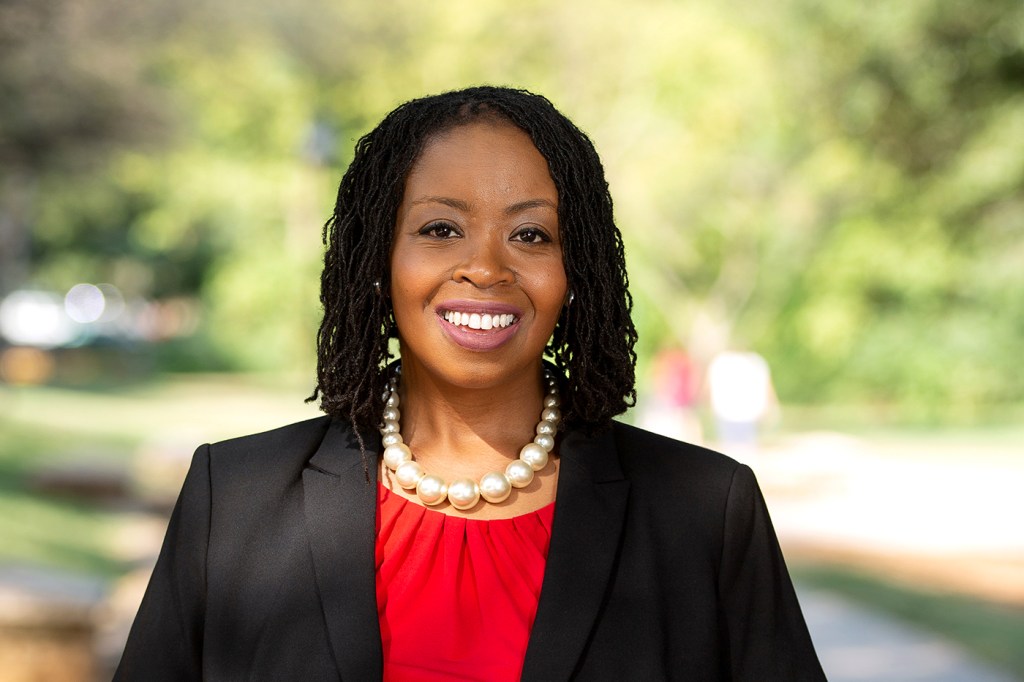Closing the racial education gap, one child at a time

Corliss Thompson, a researcher, teaching professor, and impassioned social justice advocate, likes to invoke her blind husband to emphasize a larger point about well-meaning educational systems that inadvertently set Black students up for failure.
“Calvin has been totally blind since birth,” she says of her spouse. The two first met as students at the University of North Carolina’s Charlotte campus in 2001.
“If you put him into a classroom and treat him the same way as people who can see, Calvin is probably going to fail. He doesn’t have his reading materials in Braille. He doesn’t have the opportunity to learn his way around with his cane. He would not be set up for success.”
The problem, as Thompson views it, is that almost everything in society, from the way sidewalks were designed to the way electronic gadgets are created, is devised by people who can see. Continuing the analogy, classrooms and their curriculum models are often set up the same way―by the very people who stand to gain the most from them.
“Usually white, middle class, sighted, and heterosexual―people who come from the predominant culture,” she says.
For her years of work in building culturally responsive leaders, creating pathways for improving the educational experiences of diverse students, and putting a new lens on educational disparities, Thompson was recently recognized by the Charlotte Business Journal.
Under what she calls “systemic oppression,” which includes racism, Thompson explains that a situation has developed whereby Black children are failing because institutional structures and norms are not necessarily set up to empower kids from different walks of life.
Rather, they advantage schoolchildren who come from the same societal class of those who created the system in the first place, putting marginalized students at an early disadvantage.
The imbalance isn’t overtly intentional, Thompson says. “It’s not like we have these individuals who are going around trying to fail all the Black and other underrepresented kids. That’s not generally what’s happening.”
But what is happening in the classroom and in the impoverished neighborhoods around Charlotte bothered her.
Thompson would go on to relaunch a nonprofit in Charlotte that helps Black youth develop a basic understanding of topics such as financial literacy, career development, and entrepreneurship. Her active involvement in the community includes a National Science Foundation grant to spur more minority students’ interest in STEM fields.
Peg Bernhard, dean of Northeastern’s Charlotte campus, put the NSF grant in perspective in her submission nominating Thompson to the business magazine: “As someone who has an extensive background in grant writing, I can tell you that Corliss achieved an extraordinary feat in obtaining funding through her first application. It is an absolutely rare event.”
Even more uncommon is that Thompson works in the university’s College of Professional Studies, which traditionally doesn’t attract federal research dollars.
“I love the opportunity to work in CPS because of the focus on intersecting research and best practices with jobs, careers, and helping adult learners,” she says.
The NSF grant showed that there’s more to experiential learning for children than hands-on experience. It’s about helping them build crucial social networks and relationships based on who learners are and what they know, combined with a culturally relevant curriculum.
“It’s really an opportunity to empower black kids in Charlotte,” she says.
Thompson joined Northeastern in 2013 as a faculty member in the Graduate School of Education and quickly ascended to become the faculty lead for the doctor of education program for the Charlotte region. Today, she is assistant dean of academic affairs, setting strategy for academic policy, curriculum, and research.
Along the way, Thompson has prepared leaders in social justice through the doctoral program and fostered new and creative ways of educating children through the creation of the Charlotte Lab School, which bills itself as a place to “reimagine what’s possible in public education.”
Just three years after joining Northeastern, she was nominated by her doctoral students for the Excellence in Teaching Award, becoming, in her 30s, one of the youngest and the first Black recipients of the award. This was right around the time she helped get Northeastern’s Network of Experiential Teaching and Learning up and running.
There doesn’t seem to be enough hours in the day for what Thompson hopes to accomplish next.
She wants to hire an executive director to run the day-to-day operations at the children’s nonprofit, for starters. There’s also the task of getting more people involved to take on some of the work of mentoring adults and children who might not otherwise have that kind of guidance and support.
“I can’t make all of these changes by myself,” Thompson says, “so I’m motivated to rally folks around me to move forward in our mission of empowering people through education and learning.”
For media inquiries, please contact media@northeastern.edu.





